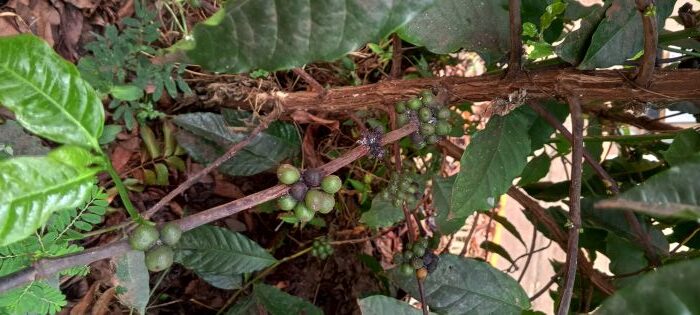LIRA CITY, September 25, 2024 – Coffee farmers in Lango Sub-region have been called upon to take care of their plantations to keep away pests and diseases that attack the perennial cash crop whose price has been increasing at a global market.
This advice was given after coffee farmers suffered losses due to attacks by coffee berry borer, coffee mealybugs, and black twig borer.
Lango Sub-region which initially concentrated more on cotton as a cash crop, now has more farmers growing coffee in the districts of Kole, Oyam, Apac, Kwania, Dokolo, Amolatar, and others. The Uganda Coffee Development Authority [UCDA] and the area politicians have been encouraging farmers in the subregion to add coffee to their list of crops grown.
Speaking of the danger caused by pests and diseases, Samuel Aber, a member of Amolatar Coffee Farmers Association said their coffee is usually attacked at the time of bearing fruits, making the farmers incur losses as the berries rot.
Aber said most coffee farmers in the region don’t have money to buy the pesticides recommended in the fight against the dangerous pests. “Although pests and diseases are always attacking our coffee farms, affording the pesticides is difficult for us,” Aber said.
On his part, Samuel Ekwang, Chairperson of Pur Ber Coffee Famer’s Group in Kwania district who has grown coffee for 10 years confirmed that his coffee always rots immediately after fruiting.
“I planted 800 stems last season but the number has reduced because of pests and diseases,” Ekwang said.
Ekwang appealed to government to at least avail the farmers with the pesticides that they can use to spray their coffee plantation so that the trees can produce high yields.
For his part, Andrew Okello Awany, the Coffee Coordinator in Lira City, and districts of Lira, Otuke, and Alebtong said coffee berry borer has been the major pest attacking coffee farms.
Okello attributed the rise of the pest to poor management of the coffee gardens after harvests, saying farmers always leave the insects in the garden.
“The major pest that has been disturbing our coffee farmers here is coffee berry borer. When the pest is left in the coffee garden, it continues to attack coffee, leading to low yields and poor quality of coffee beans,” he said, urging the farmers to bury the affected berries and burn the twigs among other measures.
He said that pesticides should be the last resort for a farmer to use in their gardens once cultural methods fail.
“The chemical should come in as the last resort when you have done all these other operations, and the problem is persisting. It is always good to spray immediately after the coffee trees begin flowering,” he said.
Among the pesticides that the coffee farmers can use are Chlorpyrifos, Imidacloprid, and Tebuconazole among others to control coffee berry borer, and prevent sucking insects like aphids and whiteflies.
There is growing evidence in Lango Sub-region that the systematic coffee planting by the UCDA has yielded positive results in the subregion.
However, despite the faster adoption of coffee in the sub-region, there are challenges that need to be addressed. The major challenges relate to lack of organised marketing and processing infrastructure to support value addition, and inadequate coffee-specialised extension support system to narrow the knowledge gap about recommended agronomic practices among farmers.
Buy your copy of theCooperator magazine from one of our countrywide vending points or an e-copy on emag.thecooperator.news
